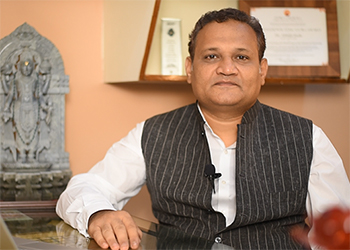
Sleep
We spend almost a third of our lifetime in sleeping. Sound sleep is the most essential element for good quality of life. Along with healthy diet and lifestyle, proper, well rested sleep is very much necessary. Many vital physiological and neurological changes are occurring during the sleep that helps people stay healthy. It is not just a physical resting but it is like a reboot mechanism naturally designed for the body as well as mind, making it ready for the next days challenges. It is established with research that both short sleepers and long sleepers are at an increased risk of mortality.
Concept of sleep in Ayurveda
Ayurveda regards ‘Nidra’ (sanskrit translation of sleep) as one of the three pillars of life on which a person’s health is balanced as it is the most essential factor responsible for healthy and fulfilling life. Sound natural sleep is nourishing hence it is also known as bhutadhatri (nourishes all living beings). As per Ayurveda sleep is a state of the body when the mind and soul is exhausted and becomes inactive along with sensory and motor organs. Sleep is induced when the Tama property of the mind empowers the consciousness. Tama is among the three qualities of mind which is predominant in kapha and is responsible for darkness, ignorance and inertia. Such qualities are required to make the body and mind to go into a state of inertia and non active, by shutting of sensory organs which ultimately makes the person go into deep rest of sleep.
Sleep in Ayurveda is classified into two types:
- Swabhavika - Natural sleep- the one at night when the entire creatures in the nature are taking rest.
- Aswabhavika – Unnatural sleep- this can be induced because of alcohol, drugs or because of the physical state of the body like sickness or injury.
Ayurveda scriptures also describe seven types of sleep which is caused by:
- Tamas- when the Tama guna of the mind suppress the consciousness, mind and the sensory organs.
- Vitiated kapha- when the individual is suffering from illness caused because of increased Kapha dosha such as in sinusitis, excess cold and cough, obesity, diabetes etc.
- Mental exertion- experienced after strenuous analytic work or work involving too much thinking and stress .
- Physical exhaustion- after activities such as heavy workout, field sports, trek or even household work.
- Agantuka– this is seen in very critically ill patients and it indicates bad prognosis leading to death.
- Complication of other diseases- such as the one caused because of imbalance of all the three dosha like certain forms of fevers, multiple organs involved diseases.
- The very nature of the night- which is the most natural physiological sleep induced by the predominant tamas guna of the night and other factors such as cold atmosphere, peace and less activities.
What is proper sleep?
Ayurveda explains the predominance of each dosha in the early, middle and later age of life. Classical Ayurveda states that the duration of sleep will be different for different stages of life which is logically understandable. The first stage of life is of childhood which is Kapha-dominant, that produces more sleep and which is very much required for proper growth and development. The middle age is Pitta-dominant and comparatively moderate sleep is required as this age is related to high physical endurance and intellectual use of mind. The old age is Vata-dominant stage in which sleep duration naturally decreases.
Age wise recommended duration of Sleep:
- Newborn 16-18 hours a day
- Pre-school-aged children 11-12 hours a day
- School-aged children At least 10 hours a day
- Teens 9-10 hours a day
- Adults (including the 7-8 hours a day
- Elderly- 6-7 hours
Effects of proper and improper sleep on the health as per Ayurveda
Ayurveda clearly specifies that one should never suppress the natural urge of sleep. By doing so it causes excessive yawning, malaise, delusion, squeezing pain all over the body, heaviness in the head and eyes, drowsiness, lassitude and headache.
| Effects of Proper Nidra (Sleep) | Effects of improper Nidra (Sleep) |
|---|---|
| Sukha (Happiness) | Dukha (Sorrows) |
| Pushti (Nourishment) | Karshya (Emaciation) |
| Bala (Strength) | Dourbalya (Weakness) |
| Vrushata (Aphrodisiac/Fertility) | Kleebata (Impotency) |
| Jnana (Knowledge) | Ajnana (Ignorance) |
| Jeevana (Life) | Marana (Death) |
Sleeping variations like excessive sleep, less or not at all, at improper times, leads to unhappiness, destroys health. As per the scriptural references excess sleep can lead to severe form of jaundice, stiffness and heaviness of the body, diseases of the head, fever, giddiness, loss of mental activity, obstruction in body channels, poor digestion, swelling, anorexia, nausea, headache, itching, pain, rashes, skin eruptions, cough and diseases of the throat.
Sleeping at improper times causes poor digestion, fever, delusion, lassitude, headache, nausea and obstruction to the tissue channels. Staying awake at night produces dryness in the system because of vitiated vata, pitta, and decreased kapha dosha. Latest research has well established that insufficient sleep can cause excessive daytime sleepiness and this can lead to problems with concentration, attention and cognitive functioning.
Ayurvedic concept of day time sleeping
Daytime napping is considered a normal part of the routine for babies and young children. For adults it can be a good habit if it is only napping of 30 to 45 mints and not sleeping for 2-3 hours. Day time napping should be done on the left side position, on a recliner and never lying flat like in a sleeping position. This will prevent acidity, reflux and other digestion related issues.
Day time sleeping according to Ayurveda is not a healthy lifestyle practice as it may vitiate all the three doshas. It increases predominantly Kapha dosha in the system leading to conditions such as swelling, obesity, cold, sinusitis, diabetes and poor digestion. One should sleep in day time only in specific situations as explained in Ayurveda such as –
- In summer, as it will help to reduce the dryness and heat inside the system.
- If one remains awake at night due to night shift work or some unavoidable causes, then one can sleep for half of the period of night sleep loss during the following morning without having breakfast.
- If exhausted because of physical exertion, activities such as carrying heavy weights or walking long distance, singing, driving, studying, alcohol consumption and sexual indulgence.
- If exhausted because of detoxification therapies.
- When suffering from indigestion, diarrhea, pain in the abdomen, hiccups, injury.
- If suffering with wasting and weakness
- In Old age.
- Exhausted by traveling, anger, grief or fear.
- For those who are accustomed to day time sleeping.
Ayurvedic guidance for sound sleep -Sleep discipline
- Before sleeping one should remember and pay respect, gratitude to the god, sages and teachers.
- One should wake up before the sun rises.
- Healthy sleep is taken routinely at the same time of night and duration.
- Avoid sleeping on a bed that is uneven, small, uncomfortable and not properly covered with sheets.
- Use proper thickness pillows.
- Avoid sleeping in the prone position.
- The bedroom should be clean and quite, calm and clean.
- The mattress should be soft and the bed should be at the height of knee joint level.
- One should think of positive thought on bed and avoid negative thoughts.
- In hot climates, it is advised to sleep in place having cool breeze as it is refreshing, arrests perspiration, removes the sense of fatigue, and alleviates any burning sensation.
- Mild pressure massage is very pleasant, pain reliving and sleep inducing.
- One should observe moderation in sleep.
- While sleeping the head should be positioned towards the east or south, but never towards the north.
- Considering the modern lifestyle one should shut off all the gadgets, avoid reading, listening to loud music, drinking coffee or tea before going to bed and too much talking.
Natural night sleep is a key for sustenance of good health hence one should always incorporate natural means to support it. Consuming chemical sedatives can be of great help in severe sleep impairment for short term management but long duration intake has ill effects on the body and mind. Benzodiazepines category of drugs are sedative, hypnotic medicines which puts one to sleep but can be addictive and very likely to cause problems with memory and attention.
Barbiturates group of drugs used for inducing sleep works by depressing the central. They can be fatal in overdose and obviously long term use can make the nervous system lethargic. Newer drugs are fast acting and they work by either binding the same receptor as the older drugs in the brain or some by affecting the brain hormone called melatonin while some affects a brain chemical called orexin and is not addictive. Sleeping pills can be dangerous in people who have certain chronic lung problems such as asthma or chronic obstructive pulmonary disease (COPD) because this drugs interfere with normal breathing mechanism.
Common side effects of prescription sleeping pills :
- Digestion upset such as- gas formation, stomach pain or tenderness, Heartburn, constipation, diarrhea, Dry mouth or throat, impaired appetite
- Physical effects- Tingling or burning in the legs or hands, arms and feet, Balance problems, Shaking of a part of the body, Headache, Weakness.
- Mental effects- Dizziness, problems with attention or memory
- Daytime drowsiness
- Groggy feeling
- On waking does not feel well rested.
Long term intake of sedative pills can make one psychologically dependent on it which can itself become a cause of anxiety and sleeplessness. One should try to avoid such chemicals and opt for natural support like the Ayurvedic herbs which will apart from inducing good sleep will also offer many more health benefits.



Benefit from choosing the best
0
Years Experience
0
k+happy customers
0
%Product purity
Copyright © 2025. All right reserved. Sukhayu Herbals
Developed by - 7Sky Infotech









